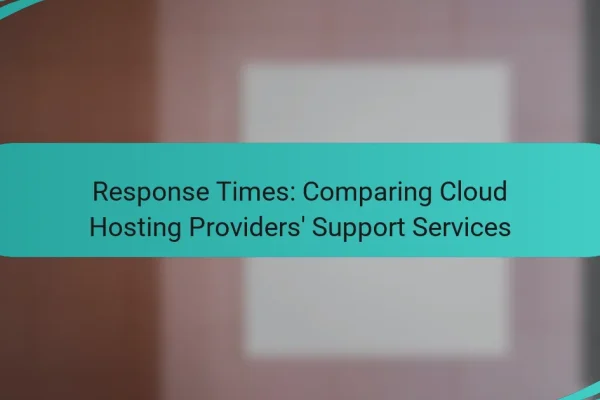
Cloud Hosting: Budget Plans, Resource Limits and Expectations
Budget cloud hosting plans offer an affordable solution for small to medium-sized projects, providing essential…
Cloud hosting solutions provide flexible and scalable options for businesses looking to enhance their online presence. With major providers like AWS, Google Cloud, and Microsoft Azure, organizations can choose from a variety of features and pricing structures tailored to their specific needs. Selecting the right provider is crucial for ensuring optimal performance, reliability, and growth potential.

Budget cloud hosting plans offer an affordable solution for small to medium-sized projects, providing essential features without breaking the bank. Providers like DigitalOcean, Vultr, and Linode deliver competitive pricing and reliable performance, making them ideal for startups and developers. However, it’s important to note that these budget options typically come with lower resource limits, which…

Understanding the importance of third-party integrations in cloud hosting is crucial for businesses seeking to optimize their operations. These integrations enhance functionality, improve scalability, and streamline workflows by connecting various applications and services. By leveraging specialized tools, organizations can achieve greater efficiency and better resource utilization in their cloud environments. What are the benefits of…

In the competitive landscape of cloud hosting, response times for support services play a crucial role in user satisfaction and service reliability. Providers like AWS, Google Cloud, and A2 Hosting are recognized for their swift support, with response times ranging from minutes to hours based on the chosen plan. Factors such as provider size, support…

Cloud hosting speed plays a crucial role in the success of e-commerce by directly influencing website loading times and user satisfaction. Effective measurement techniques are essential for identifying performance bottlenecks, while optimization strategies such as leveraging Content Delivery Networks (CDNs) and minimizing file sizes can significantly enhance user experience and boost conversion rates. How does…

Optimizing your cloud hosting budget is essential for maximizing return on investment (ROI) while ensuring performance and scalability. By selecting cost-efficient service providers, managing resource allocation, and leveraging suitable pricing models, businesses can significantly enhance their cloud spending efficiency. Regular monitoring of expenses and utilizing specialized tools further aids in effective cost management. What are…

Choosing the right Content Delivery Network (CDN) is crucial for enhancing cloud hosting performance, as it optimizes content delivery by leveraging a network of servers worldwide. By minimizing data travel distance, a CDN can significantly improve speed, reduce latency, and ensure a more reliable experience for users. Factors such as geographic coverage, performance metrics, and…

Knowledge base resources in cloud hosting play a crucial role in enhancing user experience and service efficiency. By employing various evaluation methods such as qualitative assessments and user feedback analysis, organizations can optimize these resources to better meet user needs. Effective knowledge bases are characterized by robust search functionality, well-organized content, and regular updates, ensuring…

Cloud hosting offers the flexibility to scale resources dynamically, allowing businesses to adjust computing power, storage, and bandwidth in response to fluctuating demand. This capability is crucial for maintaining optimal performance and cost efficiency, particularly during peak traffic periods. By implementing effective traffic management strategies and making seasonal adjustments, organizations can ensure their cloud infrastructure…

Evaluating API support in cloud hosting is essential for developers seeking reliable and efficient integration with their applications. Key factors to consider include the quality of documentation, community support, and the provider’s performance capabilities. Major cloud hosting providers like AWS, Google Cloud Platform, and Microsoft Azure offer varying features tailored to meet diverse developer needs….

Estimating cloud hosting costs effectively requires a solid grasp of various pricing models and estimation methods. By understanding these elements, businesses can budget accurately and avoid unexpected expenses, ensuring they select the most cost-effective solutions tailored to their needs. How to estimate cloud hosting costs effectively? Estimating cloud hosting costs effectively involves understanding various pricing…
The best cloud hosting solutions in the USA include AWS, Google Cloud Platform, Microsoft Azure, DigitalOcean, and IBM Cloud. Each of these platforms offers unique features and pricing structures that cater to different business needs.
AWS (Amazon Web Services) is a leading cloud hosting provider known for its extensive range of services and scalability. It allows businesses to pay only for what they use, making it suitable for startups and large enterprises alike.
Key features include a wide array of computing resources, storage options, and advanced analytics tools. AWS also supports compliance with various regulations, which is crucial for businesses in regulated industries.
Google Cloud Platform (GCP) is recognized for its powerful data analytics and machine learning capabilities. It offers a flexible pricing model and is particularly beneficial for businesses looking to leverage big data.
GCP provides services like Google Kubernetes Engine and BigQuery, which facilitate efficient cloud management and data processing. Its integration with other Google services can enhance productivity for teams already using Google Workspace.
Microsoft Azure is a strong contender in the cloud hosting market, especially for businesses already using Microsoft products. It offers seamless integration with Windows Server, Active Directory, and SQL Server.
Azure's hybrid cloud capabilities allow businesses to maintain some resources on-premises while utilizing the cloud for scalability. This flexibility is ideal for organizations transitioning to a fully cloud-based infrastructure.
DigitalOcean is known for its simplicity and user-friendly interface, making it a popular choice for developers and small businesses. It offers straightforward pricing and a range of services including droplets, managed databases, and Kubernetes.
With a focus on ease of use, DigitalOcean allows users to deploy applications quickly. It is particularly advantageous for startups looking to minimize overhead while maximizing performance.
IBM Cloud combines traditional cloud services with advanced AI and machine learning capabilities. It is particularly suited for enterprises that require robust security and compliance features.
IBM Cloud offers a range of services including bare metal servers and cloud-native applications. Its focus on hybrid cloud solutions allows businesses to integrate their existing infrastructure with cloud resources effectively.
Choosing the right cloud hosting provider involves assessing your specific needs, including performance, scalability, pricing, and support options. A well-informed decision can significantly impact your website's reliability and growth potential.
Performance and scalability are critical factors in selecting a cloud hosting provider. Look for providers that offer high uptime percentages, typically around 99.9%, and low latency, ideally in the low tens of milliseconds. Scalability should allow you to easily adjust resources based on traffic fluctuations without significant downtime.
Consider whether the provider supports auto-scaling features, which automatically adjust resources during peak times. This ensures that your applications remain responsive and can handle increased loads efficiently.
Cloud hosting providers typically offer various pricing models, including pay-as-you-go, subscription-based, and reserved instances. Pay-as-you-go is flexible and ideal for businesses with fluctuating traffic, while subscription models provide predictable monthly costs.
When comparing pricing, factor in additional costs such as data transfer fees, storage, and support services. Make sure to read the fine print to avoid unexpected charges that could impact your budget.
Reliable customer support is essential for resolving issues quickly. Look for providers that offer 24/7 support through multiple channels, such as live chat, phone, and email. Response times should ideally be within single-digit minutes for urgent inquiries.
Read reviews and testimonials to gauge the quality of customer service. A provider with a strong reputation for support can save you time and frustration, especially during critical situations.
Cloud hosting solutions typically range from low-cost pay-as-you-go options to more expensive enterprise models. Pricing can vary significantly based on factors such as usage, features, and service levels.
Pay-as-you-go pricing allows users to pay only for the resources they consume, making it a flexible option for businesses with fluctuating needs. Costs can range from a few cents to several dollars per hour, depending on the services utilized, such as storage, bandwidth, and processing power.
This model is ideal for startups or projects with unpredictable traffic, as it helps avoid upfront costs. However, users should monitor usage closely to prevent unexpected charges.
Monthly subscription costs for cloud hosting can vary widely, typically starting from around $10 to several hundred dollars per month. This pricing structure often includes a set amount of resources, making budgeting easier for businesses.
Subscriptions may offer additional features, such as enhanced security or customer support. Companies should evaluate their resource needs and select a plan that aligns with their expected usage to avoid overpaying.
Enterprise pricing models are tailored for larger organizations and often involve custom quotes based on specific requirements. These models can range from hundreds to thousands of dollars per month, depending on the scale and complexity of the services required.
Enterprise solutions typically include advanced features like dedicated support, compliance with industry regulations, and high availability. Businesses should engage with providers to negotiate terms that suit their operational needs and budget constraints.
Cloud hosting offers numerous advantages, including improved scalability, cost savings, and enhanced security. These benefits make it an attractive option for businesses of all sizes looking to optimize their IT infrastructure.
Cloud hosting allows businesses to easily scale resources up or down based on demand. This flexibility means that during peak times, additional resources can be allocated quickly, while during slower periods, costs can be reduced by scaling back.
For example, an e-commerce site may experience increased traffic during holiday seasons. With cloud hosting, they can temporarily increase their server capacity to handle the surge without investing in permanent infrastructure.
One of the primary benefits of cloud hosting is its cost-effectiveness. Businesses typically pay only for the resources they use, which can lead to significant savings compared to traditional hosting models that require upfront investments in hardware.
Additionally, cloud hosting eliminates the need for extensive on-site maintenance and upgrades, further reducing operational costs. Many providers offer flexible pricing plans, allowing businesses to choose options that fit their budget and usage patterns.
Cloud hosting often includes advanced security measures that can protect sensitive data more effectively than traditional hosting solutions. Features such as data encryption, regular backups, and robust firewalls are commonly integrated into cloud services.
Moreover, reputable cloud providers comply with industry standards and regulations, ensuring that businesses meet necessary security requirements. This can be particularly beneficial for companies in regulated sectors, such as finance or healthcare, where data protection is critical.
Cloud hosting comes with several risks that users should be aware of, including data security concerns, potential downtime, and vendor lock-in issues. Understanding these risks can help businesses make informed decisions about their cloud services.
Data security is a primary concern for businesses using cloud hosting. Sensitive information stored in the cloud can be vulnerable to breaches, unauthorized access, and data loss. It's essential to choose a provider that implements strong encryption, access controls, and compliance with regulations like GDPR or HIPAA.
Regular security audits and monitoring can help mitigate risks. Businesses should also consider using multi-factor authentication and keeping backups of critical data to protect against potential breaches.
Downtime and service outages can disrupt business operations and lead to financial losses. While cloud providers often guarantee high uptime percentages, outages can still occur due to various reasons, including hardware failures or network issues. It's crucial to review a provider's Service Level Agreement (SLA) to understand their uptime commitments and compensation policies.
To minimize the impact of downtime, businesses should have a contingency plan in place. This may include using multiple cloud providers or having a backup system that can be activated during outages.
Vendor lock-in occurs when a business becomes dependent on a specific cloud provider's services, making it difficult to switch to another provider without incurring significant costs or technical challenges. This can limit flexibility and increase long-term expenses. To avoid vendor lock-in, consider using open standards and technologies that facilitate easier migration between platforms.
Regularly evaluate your cloud provider's offerings and pricing structures to ensure they remain competitive. Having a clear exit strategy and understanding the data migration process can also help mitigate the risks associated with vendor lock-in.
When choosing a cloud hosting solution, prioritize scalability, reliability, and security. These features ensure that your hosting environment can grow with your needs, maintain uptime, and protect your data effectively.
Scalability in cloud hosting allows you to adjust resources based on demand. This means you can easily increase or decrease storage, bandwidth, and processing power without significant downtime or cost. Look for providers that offer auto-scaling features to manage traffic spikes efficiently.
Consider options like pay-as-you-go pricing, which can help control costs while accommodating growth. Many providers allow you to scale resources in real-time, making it easier to respond to changing business needs.
Reliability is crucial for ensuring that your applications and services remain accessible. A good cloud hosting provider should guarantee high uptime percentages, typically around 99.9% or higher. Check for service level agreements (SLAs) that outline uptime commitments and compensation for outages.
Additionally, look for redundancy features, such as data backups and multiple data center locations. This ensures that even if one server fails, your data remains safe and accessible from another location.
Security features are essential in cloud hosting to protect sensitive data. Ensure that the provider offers robust security measures, including encryption, firewalls, and regular security audits. Compliance with standards like GDPR or HIPAA may also be necessary depending on your industry.
It's beneficial to choose a provider that offers multi-factor authentication and intrusion detection systems. Regular updates and patches are also vital to safeguard against vulnerabilities.